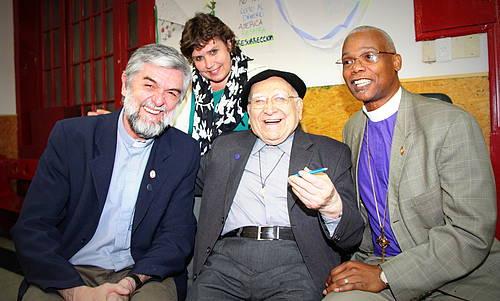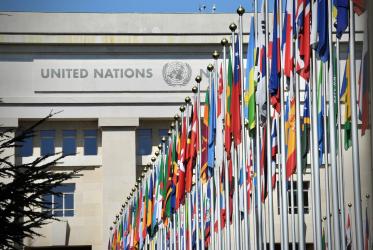The life and work of former World Council of Churches (WCC) president Bishop Federico Pagura, 89, are honored in a new book launched in Buenos Aires, Argentina, on 26 October, at the First Methodist Church of Buenos Aires (IEMA).
Dawn of Hope: Life and Witness of a Latin American Prophet is a biography of the emeritus bishop co-authored by Argentinean Methodist pastor Rev. Dr Carlos Sintado and Cuban journalist and the WCC staff member, Manuel Quintero Pérez, published by the Latin American Council of Churches (CLAI).
Beginning with a series of interviews with Pagura and persons close to him, the authors document and reconstruct Pagura’s vast intellectual work. The narrative is aimed at fostering historical memory of the Methodist bishop, who has dedicated his life to the struggle for justice and human rights. In a second part of the book, keys are proposed for interpreting Pagura’s poetry and music.
The century-old Methodist church was filled with members of several local churches involved in the ecumenical movement, human rights and civil society organizations, including the Mothers of May Square, Founding Line, as well as representatives of the government conveying greetings from the Argentinean president Cristina Fernández de Kirchner.
Sintado noted that the book is meant to recover the historical memory of those men and women of the prior generation who made an extraordinary contribution in the struggle for human rights and justice in Latin America. "And if we are to center our attention on someone when remembering, it is precisely on Bishop Pagura,” Sintado emphasized.
He said that new generations may have heard of Pagura but perhaps have not come to know his ministry, so the book tries to transmit that story.
“This is precisely the meaning of ‘tradition’ to pass on examples and testimonies to the new generations. It seems to me that what is important in the commitment of these new generations is to discover two things: first, that we are not the first and neither are we the ones who discovered the witness to the gospel in the struggle for human rights, and, second, that there have been men and women who have known how to incarnate a faithful witness to that gospel,” he said.
"In this tradition of the men and women faithful to Jesus Christ, today we want to say: Federico Pagura, your work has been the work of inspiration for thousands of men and women in Latin America and we want it to continue to be so,” concluded Sintado.
The presentation ceremony included a memorial journey through Pagura’s ministry. Bishop Jacinto Ordoñez of Costa Rica; CLAI general secretary, Rev. Nilton Giese; Nobel peace laureate, Adolfo Pérez Esquivel; the Rev. Arturo Blatezky of the Ecumenical Movement for Human Rights (MEDH), and Dr Marcelo Schneider, WCC's communication liaison for Latin America shared testimonies on the long route of memories from the life of Pagura.
This news is produced by Claudia Florentin of the Agencia Latinoamericana & Caribeña de Comunicación, in collaboration with Dr Marcelo Schneider of the WCC.







